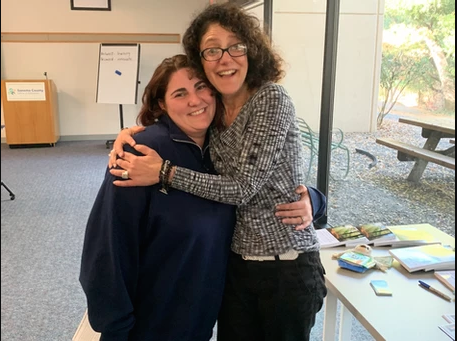How to Help Your Child Navigate the Challenges of Life
By Nick Lawrence, MA
Every parent has dreams of health and happiness for their children.
For some it is going to college, for others it is finding a career or a special hobby. Regardless of what the goal is, that is the easy part; the tough part is getting them there.
All parents have certain skill sets that make them valuable as parents, but few are really good at the hard stuff.
Hard stuff? Yes, such as your child screaming at the market, touching himself or herself inappropriately at Grandma’s house, or getting involved with the wrong crowd. Often parents yell at the child, assuming that your pain and anger will dissuade them from the behaviors. Sometimes that works, but usually it is only a temporary victory.
The underlying issue is NOT what you taught them about manners, touch, cigarettes or marijuana.
The underlying issue IS identifying you and your child’s personal values.
This might sound cliché, but it isn’t. The philosophical belief of each person is carried out, consciously or unconsciously, no matter the age. These beliefs change with time and maturity but are nevertheless present in every human being from infancy to age 100.
What does this mean for you?
It means that in spite of the family values you hold and make obvious (like practicing a religion or participating in volunteerism and philanthropy), your child may not hold the same values. This is frequently the case until adulthood, after more lived experience and time sorting out big life questions.
So, when your daughter announces she is dating a boy that you do not like, or your family values are religious and do not include premarital sex, you might find yourself in a battle.
Imagine a football player putting on his shoulder pads. This step may be necessary for each person’s experience of making life choices while maturing.
Now that I am thinking about dating, I put on the dating shoulder pads. No one can wear these pads for anyone else. This means that in spite of the teaching, reminding, drilling, and hoping that parents do to prepare a child for life, ultimately the child has to face living within a personal set of values and subsequent choices.
Ugh! Thanks, Nick!
This is actually really great news! If you know that each person has to make their own happiness, then you can anticipate and plan for the maturity points that each person goes through while growing up. By planning, I don’t mean organizing their relationships, but discussing the most important aspect of decision-making: values.
What is a value? A value is a person’s principle or standard of behavior; one’s judgment of what is important in life.
One of the best things you can do with your children, starting by age 5, is to talk about your family and personal values. Five-year-olds will understand the basics of what you mean. The funny thing is that many people assume they know what their values are but when it comes right down to it, they haven’t actually given much thought or haven’t examined them in a while.
Here is a list of 20 common human values for you to peruse. Circle or add your five most important values:
| Authenticity | Adventure | Balance | Compassion |
| Community | Determination | Fairness | Friendship |
| Growth | Happiness | Honesty | Justice |
| Kindness | Loyalty | Openness | Optimism |
| Respect | Service | Stability | Trustworthy |
The fact is, we may look at our child’s friend and only see that they are “wearing weird clothes” and “smell unusual.” They may have lots of piercings or come from a very different culture, do things another way or eat unfamiliar foods to you. Instead of falling into the trap of telling your child who they can choose as friends, talk with them about “friendship values.”
Without directly telling your children what to do, you can help them decide what is in their best interest by handing them the “shoulder pads” for any situation.
For example, your child looks at the list above and chooses Honesty and Loyalty as their top two friendship values. Instead of telling them what they mean, ask them, “What do these mean to you?
Discuss these together:
How would you know you and your friend are practicing them? And how would you know if you were not?”
Scenario 1: Honesty and Loyalty
Your daughter, Julia, gets invited to a sleepover with her best friend, Missy. When she arrives, another girl, Vicky, has also been invited to the sleepover. Your daughter is upset and feels betrayed by Missy. It also makes her feel insecure because Vicky was already at the house, and had obviously been there a while when your daughter arrived.
Common parental response: “Don’t worry, everything is fine. Don’t be so sensitive; I am sure you will have fun.
Values driven response:
Parent: “Ouch, honey, I can see why you are upset. Did you and Missy ever talk about your friendship values? They are honesty and loyalty, right? Did you know Vicky was getting invited? Are you worried about losing your best friend?”
Julia: Yes, we talked about them, and Missy said she is my BFF. I don’t even like Vicky. I don’t know her at all, She just moved here!
Parent: But did Missy agree to your values? Does she share them?
Julia: Well, not exactly. She chose friendship and kindness. Vicky is a new girl in our class. Maybe Missy is still my best friend after all and is just being kind to a new friend. Missy did choose friendship and kindness.
Parent: Hey, why don’t you invite Vicky to think about her own values and the three of you can talk about how each value shows up in your lives and why they are important to you? Then if you decide to do more things together you will know how to better get along.
Julia: Oh my gosh! Thank you, Mom/Dad. I really feel like you trust me to make good decisions!!
Scenario 2: Respect and Openness
Your teen son has fallen head-over-heels in love with a girl his age. He is so taken by her he has actually started grooming and wearing deodorant! (This is BIG!!!) In your family discussion about personal values, he stated his top two are respect and openness.
Parent: Doug, I would like to talk with you about your new girlfriend, Teri.
Doug: Ugh! Pleeeeeeeeeeze leave me alone.
Parent: Ha-ha! Doug, this is important. Remember when you shared your top two values are respect and openness? Have you had a chance to share them with Teri? It is essential at EVERY age to share what is important to you before things get too serious. It is much harder to repair hurt feelings than to honor boundaries in the first place. Actually, first you have to know what your partner’s boundaries are to be able to know if you are in agreement with them because of how they will impact you and for you to be able to respect and honor them. This is definitely adult level stuff!!
Doug: Yes, we did discuss my values. It was a little awkward because Teri’s parents have never asked her anything like this, so she had to really think about it. She agreed to mine.
-One week later-
Doug is playing depressing music in his room and has stopped grooming.
Parent: Doug? Did something happen with you and Teri?
Doug: Just leave me alone.
Typical parental response: I knew that girl was trouble. She just wasn’t good enough for you! You know, you are really just too young to handle this kind of adult stuff. I am sorry you are in pain, but it is for the best! Now you can focus on your grades!
Values driven response: Doug? Tell me what happened. Did something affect your relationship values of respect and openness?
Doug: (crying) Yeah! I went to meet her at her locker and Craig was there and they were totally flirting with each other. I didn’t know what to do so I just gave her the apple I got her and walked away. We talked after school and she admitted that she didn’t want to have only one boyfriend, that she wasn’t ready to make a commitment like that.
Parent: That must have hurt! I have been through things like this, too, son. What I did is I asked myself, “Did I do a good job sharing my values? What did I just learn about my values? What can I do better next time so I get a better outcome?”
Doug: Wow! Mom/Dad! I was sure you were going to chastise me or make me feel like an idiot. But you didn’t! In fact, I feel better! You are right, I didn’t really do a very good job of communicating what was important to me. When she didn’t know her values and just took mine, I thought we were in agreement. It turns out we weren’t at all. I just assumed we meant the same thing. Thank you so much! You are the best!!
What we are witnessing is the parent having the wisdom to understand that we are each responsible for our own happiness; and there are skills that need to be developed in each of us to get what we want in life. Childhood is the perfect time to have these conversations, so your kids can become more adept, self-reflective, and communicative. Your child now has the capacity to ask themselves what is most important to them and to practice communicating the answer within the family!
There will be times when your child absolutely defies everything you have poured into them. It is called individuation and happens between age 11-25. The only thing you can really do is teach them to look at values for the answers to life’s most important questions, and to be there with a mirror pointing them back to look at their own reflection. When you get out of the way and allow kids to make their own decisions, they will come to you with their real problems. Parents that react or shame them will be the first ones to be rejected by their kids.
The bottom line is, discover your own values; live by your values; teach your kids to discover their own values and support them in living by their own values. In this way, each person is responsible for one’s own experiences, and the values of love and togetherness will sound like a bell calling everyone home.
Nick Lawrence, MA is a parent trainer and the Sonoma county Instructional Manager & Lead Trainer for
Foster and Kinship Care Education Programs out of Santa Rosa Junior College and Runs Tools for Life. Nick has fostered numerous children and is an adoptive parent. A Family Resiliency Coach, an Emotional Freedom Technique Trainer, and a Therapeutic Intervention Trainer are a few other areas of his expertise.









